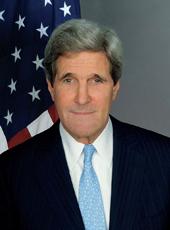Good morning, this is John Kerry.
Yesterday, we said goodbye to President Ronald Reagan.
For his children and his friends, and most of all, for his courageous wife Nancy, this painful goodbye began almost ten years ago, with the diagnosis of a disease that took Ronald Reagan away before it took his life.
There is a moment after you get the call from a doctor that you or a loved one must face a disease like Alzheimer's where you decide that it can't mean the end – that you won't let it. So in our own way, we become researchers and scientists. We become advocates and friends, and we reach for a cure that cannot – that must not – be too far away.
Some call this denial. But I'm sure that Nancy Reagan – the wife of an eternal optimist – calls it hope.
She told the world that Alzheimer's had taken her own husband to a distant place, and then she stood up to help find a breakthrough that someday will spare other husbands, wives, children and parents from the same kind of heartache.
Millions share this hope, and it is because of their commitment that stem cell research has brought us closer to finding ways to treat Alzheimer's and many other diseases.
Today, more than 100 million Americans have illnesses that one day could be cured or treated with stem-cell therapy. Stem cells could replace damaged heart cells or cells destroyed by cancer, offering a new lease on life to those suffering from diseases that once came with a certain death sentence. Stem cells have the power to slow the loss of a grandmother's memory, calm the hand of an uncle with Parkinson's, save a child from a lifetime of daily insulin shots, or permanently lift a best friend from his wheelchair.
Chances are that you love someone with such a disease. You may be that someone. So what can we do to make sure that doctors and scientists keep learning, keep discovering, and keep researching stem cells so that the incredible potential for discovery becomes a reality in people's lives?
We must lift the barriers that stand in the way of science and push the boundaries of medical exploration so that researchers can find the cures that are there, if only they are allowed to look. We can do this while providing strict ethical oversight.
We must make the funding of stem cell research a priority in our universities and our medical community. And we must secure more funding for it at agencies like the National Institutes of Health and the National Science Foundation.
Above all, we must look to the future not with fear, but with the hope and the faith that advances in medicine will advance our best values. America has always been a land of discovery – of distant horizons and unconquered frontiers. But progress has always brought with it ethical concerns that this time we have gone too far. Believe it or not, there was a time when some questioned the morality of heart transplants. Not too long ago, we heard the same kind of arguments against the biotechnology research that now saves stroke victims and those with leukemia.
I know there are ethical issues, but people of goodwill and good sense can resolve them. For I also know the fear that most Americans feel at some point – the fear of a diagnosis that may take our life or sentence us to a diminished life.
In the past few years, I have seen cancer and stroke take my own parents. Last year, because of the remarkable medical advances we have made, I was cured of prostate cancer. Now everywhere I go in America, people come up to me and tell me about their struggle with illness or the bravery of family members who faces it. They share their worries, but they also believe that this is a country of the future, a can-do country.
The medical discoveries that come from stem cell are crucial next steps in humanity's uphill climb. And part of this nation's greatness lies in the fact that we have led the world in great medical discoveries, with our breakthroughs and our beliefs going hand-in-hand.
If we pursue the limitless potential of our science – and trust that we can use it wisely – we will save millions of lives and earn the gratitude of future generations.
Thanks for listening.
John F. Kerry, Democratic Radio Address Online by Gerhard Peters and John T. Woolley, The American Presidency Project https://www.presidency.ucsb.edu/node/216854

